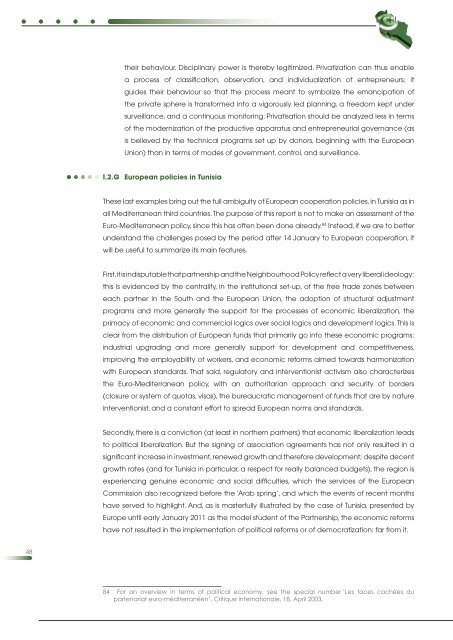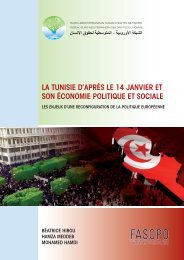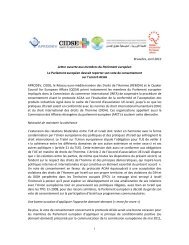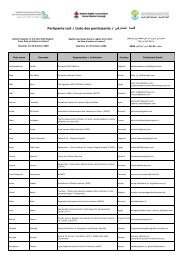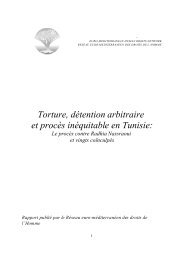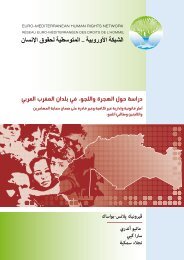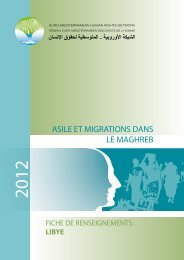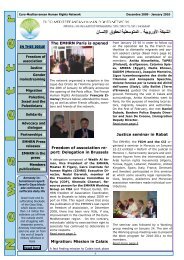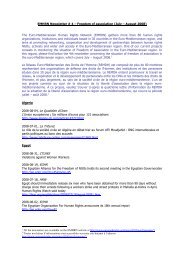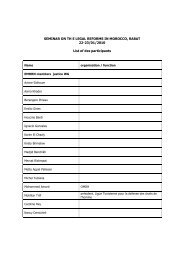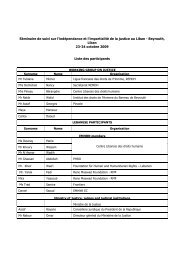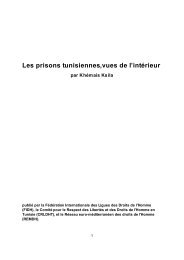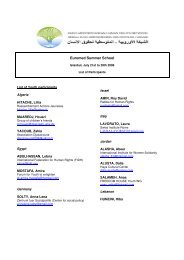tunisia after 14 january and its social and political economy - Refworld
tunisia after 14 january and its social and political economy - Refworld
tunisia after 14 january and its social and political economy - Refworld
Create successful ePaper yourself
Turn your PDF publications into a flip-book with our unique Google optimized e-Paper software.
their behaviour. Disciplinary power is thereby legitimized. Privatization can thus enablea process of classification, observation, <strong>and</strong> individualization of entrepreneurs; itguides their behaviour so that the process meant to symbolize the emancipation ofthe private sphere is transformed into a vigorously led planning, a freedom kept undersurveillance, <strong>and</strong> a continuous monitoring. Privatisation should be analyzed less in termsof the modernization of the productive apparatus <strong>and</strong> entrepreneurial governance (asis believed by the technical programs set up by donors, beginning with the EuropeanUnion) than in terms of modes of government, control, <strong>and</strong> surveillance.I.2.G European policies in TunisiaThese last examples bring out the full ambiguity of European cooperation policies, in Tunisia as inall Mediterranean third countries. The purpose of this report is not to make an assessment of theEuro-Mediterranean policy, since this has often been done already. 84 Instead, if we are to betterunderst<strong>and</strong> the challenges posed by the period <strong>after</strong> <strong>14</strong> January to European cooperation, itwill be useful to summarize <strong>its</strong> main features.First, it is indisputable that partnership <strong>and</strong> the Neighbourhood Policy reflect a very liberal ideology:this is evidenced by the centrality, in the institutional set-up, of the free trade zones betweeneach partner in the South <strong>and</strong> the European Union, the adoption of structural adjustmentprograms <strong>and</strong> more generally the support for the processes of economic liberalization, theprimacy of economic <strong>and</strong> commercial logics over <strong>social</strong> logics <strong>and</strong> development logics. This isclear from the distribution of European funds that primarily go into these economic programs:industrial upgrading <strong>and</strong> more generally support for development <strong>and</strong> competitiveness,improving the employability of workers, <strong>and</strong> economic reforms aimed towards harmonizationwith European st<strong>and</strong>ards. That said, regulatory <strong>and</strong> interventionist activism also characterizesthe Euro-Mediterranean policy, with an authoritarian approach <strong>and</strong> security of borders(closure or system of quotas, visas), the bureaucratic management of funds that are by natureinterventionist, <strong>and</strong> a constant effort to spread European norms <strong>and</strong> st<strong>and</strong>ards.Secondly, there is a conviction (at least in northern partners) that economic liberalization leadsto <strong>political</strong> liberalization. But the signing of association agreements has not only resulted in asignificant increase in investment, renewed growth <strong>and</strong> therefore development; despite decentgrowth rates (<strong>and</strong> for Tunisia in particular, a respect for really balanced budgets), the region isexperiencing genuine economic <strong>and</strong> <strong>social</strong> difficulties, which the services of the EuropeanCommission also recognized before the ‘Arab spring’, <strong>and</strong> which the events of recent monthshave served to highlight. And, as is masterfully illustrated by the case of Tunisia, presented byEurope until early January 2011 as the model student of the Partnership, the economic reformshave not resulted in the implementation of <strong>political</strong> reforms or of democratization: far from it.4884 For an overview in terms of <strong>political</strong> <strong>economy</strong>, see the special number ‘Les faces cachées dupartenariat euro-méditerranéen’, Critique internationale, 18, April 2003.


